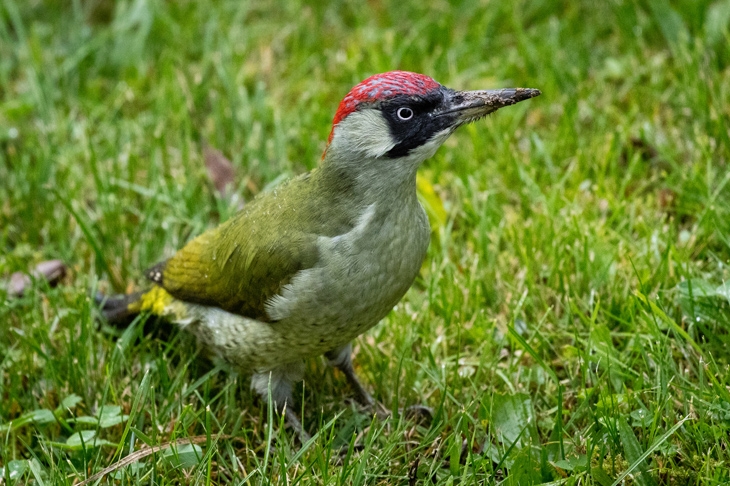Ever since I was a child, I’d always yearned to see a green woodpecker. With its scarlet cap and lime-green body, it looks far too colourful and exotic to be a native species. But it very much is, as you can tell from the fact that it has a rustic nickname — the yaffle.
This, incidentally, is how Professor Yaffle — the carved wooden bookend which comes to life as a drily academic woodpecker, the ‘font of all knowledge’, apparently based on Bertrand Russell — in the 1970s children’s TV series Bagpuss got his name.
But I digress. The point is, I never did get to see a green woodpecker till my mid–forties when I moved to the country. They’re so common round us that I spot them every time I go for a walk, identifiable by their loud, urgent, laughing call, their swooping flight pattern and the green on their back which looks more like yellow in sunlight. Only when you’re lucky, though, do you get to see them up close — like the other day when I found one trapped by the anti-rabbit fence in the back garden.
At first I thought it was a mature bird which had been wounded by the cat. But on closer examination it turned out to be a fledgling. They’re nearly as big as the adults and have the same colouring, only it’s speckled rather than solid. This, our resident ornithologist Lee told me, is so rival adult birds don’t attack it. The speckles say: ‘Leave him alone, he’s only a kid.’
Obviously the fledgling couldn’t fly or it would have escaped. So I quickly went to retrieve it before the cat discovered it. Because he pecked me a lot with his long sharp beak when I picked him up, I decided to call him Pecky.
‘He won’t survive. You’ll never get him to feed,’ said Lee, on the phone. It’s true: the fledglings you try to save in cardboard boxes never make it, do they? Still we thought it was worth a shot, so the Fawn and I made Pecky a little water bath and, as per Lee’s instructions, put him on the nearest flat roof so that he’d have a reasonable chance of taking off and not getting eaten by the dog, who is even worse than the cat.
Every time we came out to look at him, Pecky had made another suicide dive. Instead of taking off, he’d either landed in a heap on the gravel or with his head stuck down the drain. Once, I feared I’d lost him, till I tracked him down — by following the trail of loose feathers — to where he was skulking in some bushes. After each escape bid, Pecky looked weaker and more bedraggled. He clearly wasn’t going to last much longer.
Then a miracle happened. Well sort of: the Fawn went to dig up some of the red ants in which our region abounds. She put them in a bowl and, lo!, Pecky feasted on them with eager abandon. It was like watching your child weaning on its first mashed banana. ‘You got him to feed? Incredible!’ said Lee, a bad-assed Geordie who is never impressed by anything. He drove round instantly to admire our handiwork. Meanwhile I began taking mental notes for the inevitable book and heartwarming movie.
That night, the story took a bizarre and sinister turn. Pecky had vanished from the cardboard box where we’d left him on the flat roof. The likely culprits were either the rooks at the bottom of the lawn or the little owl who lives in the old apple tree. Probably the rooks, because I could hear them cackling to one another triumphantly. Since we didn’t like to think of Pecky being torn to pieces by predators, we pretended to ourselves it was possible that he’d suddenly acquired flying skills in the night.
Only the next day, in the course of a conversation with the woman who works at the hotel next door, did I discover the real culprit. She’d come to retrieve her dog’s rubber toy from our drive and when I mentioned Pecky she conceded, almost as an afterthought, that she’d come and taken him. For his own safekeeping, supposedly. ‘You outrageous woodpecker thief!’ I wanted to say, but didn’t a) because I was so happy and relieved and b) because there’s no arguing with people about animals.
Besides, it was a valuable twist and turn for the storyline of the movie which was now developing nicely. I could see the penultimate scene already: ‘Fly free, little Pecky!’ I’d say as I launched him, now healed and fat with ants, into the wild. Then the final scene would be a year later, with Pecky suddenly swooping from nowhere to rejoin me — maybe taking titbits from my hand or sitting on my shoulder like a pirate’s parrot — before leading me to his nest where a new generation of baby Peckys would be revealed. Oh how the tears would have rolled down the audience’s cheeks!
Well that was the plan. But it didn’t quite work out that way. The next day, Pecky pretty much stopped feeding. He became so weak that when he tried to have a drink he couldn’t get out of his water dish, which was where I found him, half-drowned, on the way to take him to the nice vet who had agreed to see him, gratis, as part of his duty of care.
By the time we got there — with all three vets in the surgery eagerly waiting to see our unusual pet — Pecky’s eyes were closed and his body was limp. He’s now in the freezer, awaiting the attentions of the taxidermist.
Do you think if I rejig the script a bit and changed the odd detail it might yet make a bestseller?







Comments